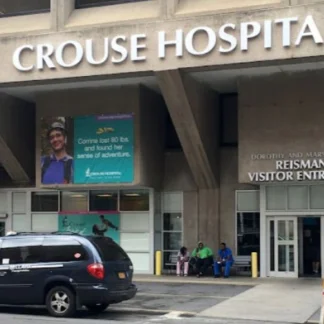Syracuse Behavioral Healthcare - Supportive Living
Syracuse Behavioral Healthcare – Supportive Living is a private rehab located in...
Crouse Hospital offers outpatient treatment for individuals with alcohol and/or substance addiciton. The program includes individual counselling, group therapy and more. Crouse Hospital is located at Syracuse, New York.
Crouse Hospital has been caring for generations of Central New Yorkers since 1887. They are a private, non-profit hospital compromised to provide support for patients that need substance addiction services or behavioral health assistance. Through their treatment methods they hope to provide a better lifestyle for their patients.
From hospital-based withdrawal management to a variety of outpatient programs, Crouse Hospital’s Chemical Dependency Treatment Services gives you options to meet you and your family’s needs during your treatment and recovery. There are limited service provided for individuals under 18 years.
The medically assisted detox at Course Hospital is designed for those with acute symptoms. An interdisciplinary team of healthcare professionals work with each patient to provide individual therapy as an introduction to treatment. At Crouse, you’ll find an experienced, multidisciplinary healthcare team, including an internist, psychiatrist, psychologist, nurses and counselors.
Contact us for more information: (315) 470-7111

Connect with Crouse Hospital - Irving Avenue by calling their admissions team directly.
(315) 470-7111 Website Get DirectionsCognitive Behavioral Therapy (CBT) is a therapy modality that focuses on the relationship between one's thoughts, feelings, and behaviors. It is used to establish and allow for healthy responses to thoughts and feelings (instead of unhealthy responses, like using drugs or alcohol). CBT has been proven effective for recovering addicts of all kinds, and is used to strengthen a patient's own self-awareness and ability to self-regulate. CBT allows individuals to monitor their own emotional state, become more adept at communicating with others, and manage stress without needing to engage in substance abuse.
Group therapy is any therapeutic work that happens in a group (not one-on-one). There are a number of different group therapy modalities, including support groups, experiential therapy, psycho-education, and more. Group therapy involves treatment as well as processing interaction between group members.
In individual therapy, a patient meets one-on-one with a trained psychologist or counselor. Therapy is a pivotal part of effective substance abuse treatment, as it often covers root causes of addiction, including challenges faced by the patient in their social, family, and work/school life.
Trauma therapy addresses traumatic incidents from a client's past that are likely affecting their present-day experience. Trauma is often one of the primary triggers and potential causes of addiction, and can stem from child sexual abuse, domestic violence, having a parent with a mental illness, losing one or both parents at a young age, teenage or adult sexual assault, or any number of other factors. The purpose of trauma therapy is to allow a patient to process trauma and move through and past it, with the help of trained and compassionate mental health professionals.
Group therapy is any therapeutic work that happens in a group (not one-on-one). There are a number of different group therapy modalities, including support groups, experiential therapy, psycho-education, and more. Group therapy involves treatment as well as processing interaction between group members.
In individual therapy, a patient meets one-on-one with a trained psychologist or counselor. Therapy is a pivotal part of effective substance abuse treatment, as it often covers root causes of addiction, including challenges faced by the patient in their social, family, and work/school life.
Trauma therapy addresses traumatic incidents from a client's past that are likely affecting their present-day experience. Trauma is often one of the primary triggers and potential causes of addiction, and can stem from child sexual abuse, domestic violence, having a parent with a mental illness, losing one or both parents at a young age, teenage or adult sexual assault, or any number of other factors. The purpose of trauma therapy is to allow a patient to process trauma and move through and past it, with the help of trained and compassionate mental health professionals.
In individual therapy, a patient meets one-on-one with a trained psychologist or counselor. Therapy is a pivotal part of effective substance abuse treatment, as it often covers root causes of addiction, including challenges faced by the patient in their social, family, and work/school life.
Trauma therapy addresses traumatic incidents from a client's past that are likely affecting their present-day experience. Trauma is often one of the primary triggers and potential causes of addiction, and can stem from child sexual abuse, domestic violence, having a parent with a mental illness, losing one or both parents at a young age, teenage or adult sexual assault, or any number of other factors. The purpose of trauma therapy is to allow a patient to process trauma and move through and past it, with the help of trained and compassionate mental health professionals.
Trauma therapy addresses traumatic incidents from a client's past that are likely affecting their present-day experience. Trauma is often one of the primary triggers and potential causes of addiction, and can stem from child sexual abuse, domestic violence, having a parent with a mental illness, losing one or both parents at a young age, teenage or adult sexual assault, or any number of other factors. The purpose of trauma therapy is to allow a patient to process trauma and move through and past it, with the help of trained and compassionate mental health professionals.
Syracuse Behavioral Healthcare – Supportive Living is a private rehab located in...
Hutchings Psychiatric Center – Madison is a public rehab located in Syracuse, Ne...
University Hospital of SUNY – Inpatient Psychiatric is a public rehab located in...
Hutchings Psychiatric Center – Irving is a public rehab located in Syracuse, New...